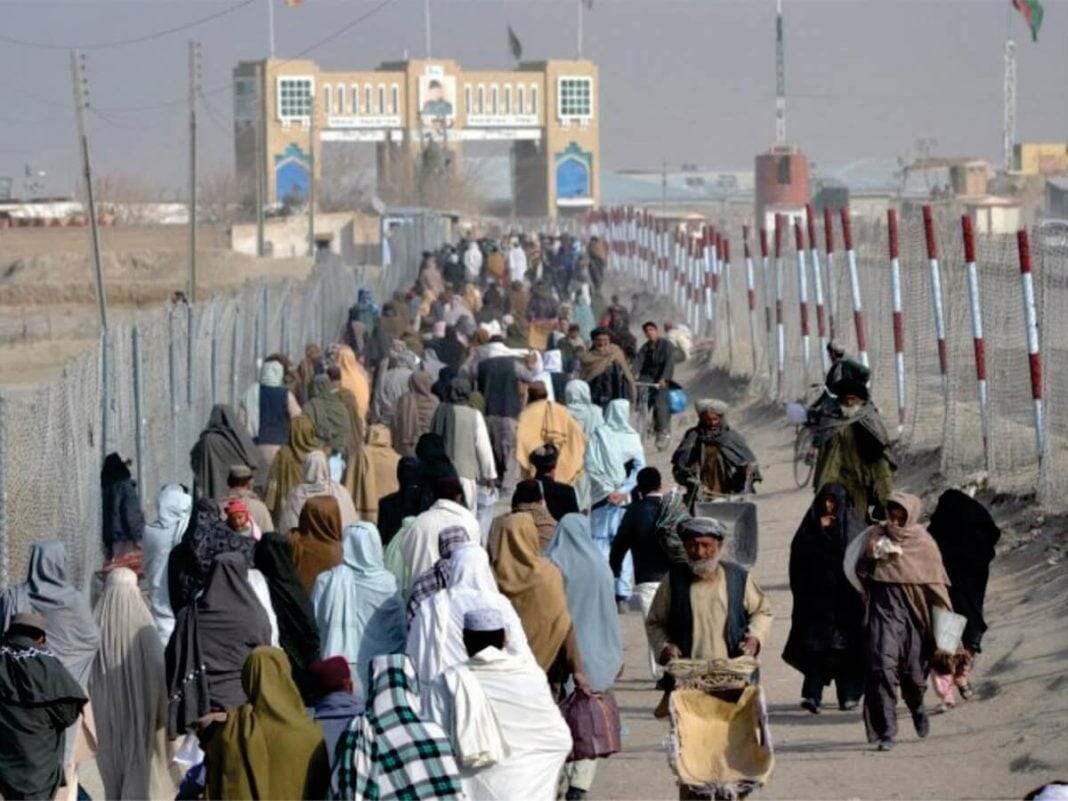Pakistan is in a unique situation because as much as the refugees are a burden on its economy, they are also an opportunity for Pakistan to earn revenue from immigration fees.
Should Pakistan offer citizenship to refugees? Yes.
Pakistan can earn billions of USD in immigration fees. Most refugees are from Afghanistan, a neighbor that has similar cultural values and potential of becoming a valuable trade partner. Just like refugees around the world, Afghan refugees lack education and skills, as a result they are exploited. Afghan refugees face multiple issues, for example, in the KPK province of Pakistan, all Pakistanis have health cards (Sehat Sahulat Program) but refugees are not eligible for this benefit. Despite these issues, these refugees don’t want to return to their native countries.
| Country/ community | Number of refugees and illegal migrants |
| Afghanistan | 3 million (1.4 million registered and 1.6 million unregistered) |
| Bengali | 2 million (approx. 10% of population in Karachi is comprised of illegal Bengali) |
| Rohingya | 500,000 |
The UN Refugee Agency UNHCR expects up to half a million Afghans will take refuge in Pakistan and in other countries in the early 2022. Similar concerns have been raised by the Mixed Migration Centre and have referenced to another report that states up to 30,000 Afghans are fleeing the country every week. The UNHCR is seeking $299 million in urgent funding to prepare and aid the expected outflow of Afghan refugees, approx. $598 per refugee. Who is going to foot the bill after this EXORBITANT amount by the UNHCR? Well, you guessed it right, the host country, more specifically, Pakistan.
Many Afghans would like to find refuge in the Western world, but they will not be accepted in Western countries. As per the NY Times, wealthy refugees are welcomed but others are not welcomed. This means that majority of refugees will end up in Pakistan because that is the closest area of safety for Afghans fleeing from violence and persecution.
Majority of people and govt. in the Western world have already raised concerns about Afghans coming to their countries. Another option for Afghans is to go to Iran but based on previous history, Iran may only welcome non-Pashtuns and shia refugees. American commentators and politicians have raised concerns about bringing Afghan refugees to the USA.
The Washington Post has recently noted:
The bigotry oozes forth from former president Donald Trump, who set the exodus in motion by signing a deal with the Taliban last year to seal the U.S. departure and now, along with others in his party’s nativist ranks, warns of terrorists infiltrating American communities, masquerading as refugees.
Pakistan can seize the opportunity by offering refugees a path to citizenship in Pakistan. Before we discuss the financial benefits for Pakistan, let’s look at the issues and answers for refugees and illegal migrants and Pakistanis:
Issues faced by refugees
- hurdles in accessing education and healthcare
- exploitation of undocumented workers
- taxpayers are not willing to spend money on this segment of society
Here are some facts for refugees to ponder –
- Pakistan is the best option because there is no other option
- refugees face similar issues everywhere in the world
- Pakistan expects gratefulness and loyalty in return
Concerns of Pakistanis about refugees
- terrorism, drug trade and human trafficking
- stealing jobs from low-income Pakistanis by working at lower rates
- impact on culture of Pakistan
- no efforts to assimilate into mainstream
Here are some facts for Pakistanis to consider –
- terrorism, drug trade and human trafficking will take a hit because the refugees will not be a vulnerable segment of the society anymore
- a few million foreigners will not be able to change the economy and culture negatively, specially, when they have already been in that society for decades
- with authorization to work, refugees will not work at lower rates, that will create an even playing field for all workers and will pay tax on income
- first generation of migrants may never assimilate fully so focus should be on the new generation that is growing up in Pakistan
Question – Are the refugees going back?
Answer – NO!
If Pakistanis know that refugees are NOT going back, then why not make them a part of the economy?
This will help Pakistan’s security situation too because now govt. can keep track of these refugees through NADRA.
Potential revenue by offering citizenship – Western countries charge thousands of USD in fees of immigration application and then applicants must pay for lawyers too (subsidized in some countries). This does not include revenue from applications that were rejected, and it also not include the financial resources that migrants bring to make their new home. That influx of money is in billions of USD per year.
Pakistan can revise its decades old immigration policy and offer path to citizenship. There can be a Pakistan card (like Green Card) in path to full citizenship of the country. A proposed path for refuges could be as follows:
| Pakistani citizenship process for refugees | Fee (USD) | Processing time |
| Biometrics | 100 | 3 weeks |
| Security and background check | 200 | 3 weeks |
| Application (per person) | 10,000 | 4 weeks after biometrics and security clearance |
| Dependent child fee (under 18) | 5,000 | 4 weeks after biometrics and security clearance |
| Pakistan Card (PC) valid for 5 years | 0 | Immediately after application is accepted |
| Full citizenship (per person) | 1,000 | 4 weeks after passing citizenship test |
Bengali Refugees – Hopefully, they will be recognized as Pakistani citizens in 2022 because majority of them are citizens of Pakistan that have migrated from erstwhile East Pakistan due to civil war. If there are any Refugees that may be required to apply for citizenship, then they will need to follow the same process. Bengali refugees may not face same financial challenges in paying this fee because many have lived in Pakistan since early 70s and may have the means and community support to pay this fee.
Our focus will remain with Afghan refugees. With the above fee structure –
- let’s say 5% of the Afghan refugee population in Pakistan submit their applications. This means 150,000 (5% times 3,000,000) refugees will apply for citizenship.
- If average family size is five with two adults and three dependents, then Pakistan will receive 40% applications for adults and 60% applications for dependents.
- Breaking down the above numbers, 40% of 150,000 is 60,000 applications times $10,000 each and 60% of 150,000 is 90,000 times $5,000 each.
- Mathematically, 60,000 X $10,000 = $600,000,000 US and 90,000 X $5,000 = $450,000,000 US.
There is a potential of approx. $1 billion US. This is a worst-case scenario where only 5% of the refugee population will apply for Pakistani citizenship.
Can refugees come up with the fee of $10K and $5K for adult and dependent applications respectively? Yes, they can.
How are the Afghan refugees going to pay? Here are some sources that can fund the path of citizenship for Afghan refugees:
- Payment from own funds. Many Afghan refugees that have worked for the international organizations in past 20 years may have funds to pay the fee. There are many refugees that have established businesses in Pakistan and may be able to pay the fees.
- Many people also benefit from the lucrative opium trade. As per the UNODC, by opium production, Afghan farmers earn $1.5 US in sales. Many farmers and people involved will be interested in a scheme to get a permanent legal status in Pakistan.
- Afghan Govt. The Afghan govt. will eventually receive the blocked funds and a portion can be used to pay for citizenship fee for refugees. This will be a great help for the Afghan govt. because they don’t have the means to support an influx of Afghans returning from Pakistan.
- International donors – Many organizations like the UN and Red Cross and few countries are financially helping refugees in Pakistan. These organizations and countries can use those funds to pay for citizenship fee. This will address their concerns about the well being of Afghan refugees in Pakistan.
- Afghan diaspora – Afghan diaspora in the Western countries can also provide funds for citizenship fee of Afghan refugees. Most countries are not accepting refugees from Afghanistan. The Afghan diaspora lament the fact that their relatives/ countrymen are living as refugees in Pakistan without a future, therefore, a path to Pakistani citizenship will be welcomed by many people.
Steps to be taken by Pakistan:
- Update Pakistani laws about immigration and citizenship.
- In parallel, deport refugees that have not registered or have been involved in criminal activities.
- Demand UN and other stakeholders to create Internally Displaced Persons (IDP) camps in Afghanistan so flow of refugees can stop.
- Close Afghan refugee camps and enable refugees to return to Afghanistan.
- Reduce the number of visas and implement strict controls at border crossings.
- Create a taskforce to stop or at least significantly curtail smuggling between Pakistan and Afghanistan.
Pakistan has given many sacrifices and continues to face challenges in the Afghan saga. It is time for Pakistan to make decisions that are based on harsh ground realities. Pakistan can’t continue to be home for refugees around the world.
Imran Siddiqui is an experienced analyst in the field of geo-politics, defence projects and economy. He holds a degree in Finance from University of Houston.
Imran has helped former President Gen. Musharraf to set-up his political party in North America. He regularly contributes to geopolitics and defense analysis and firmly believes in economic stability as the key to defeat global extremism.








